
Journal of Sufi Studies
Scope & Guideline
Illuminating the Rich Tapestry of Sufi Heritage
Introduction
Aims and Scopes
- Historical Analysis of Sufism:
The journal emphasizes rigorous historical research on significant figures, movements, and events within Sufism, contributing to the understanding of its evolution and impact across different regions and eras. - Philosophical and Theological Exploration:
It delves into the philosophical underpinnings of Sufi thought, examining key concepts such as 'wahdat al-wujud' (the oneness of existence) and other theological constructs that shape Sufi beliefs and practices. - Cultural Studies and Ethnography:
By investigating the cultural expressions of Sufism, including poetry, art, and rituals, the journal highlights the interplay between Sufism and local traditions, thereby enriching the understanding of its contemporary relevance. - Interdisciplinary Approaches:
The journal encourages the integration of various academic disciplines, including literature, sociology, and religious studies, to provide a comprehensive overview of Sufi practices and their societal implications. - Contemporary Issues in Sufism:
It addresses modern challenges faced by Sufis, such as the interplay between Sufism and political dynamics, as well as the role of Sufism in contemporary society, particularly in regions like South Asia and the Middle East.
Trending and Emerging
- Sufism and Political Dynamics:
Recent publications increasingly explore the intersection of Sufism with political issues, particularly in the context of South Asia and the Middle East, highlighting the role of Sufis in social movements and political discourse. - Globalization and Sufism:
There is a growing interest in how globalization affects Sufi practices and communities, particularly in the diaspora, revealing how Sufism adapts and transforms in new cultural contexts. - Sufism and Gender Studies:
Emerging research emphasizes the role of women in Sufism, both historically and in contemporary settings, challenging traditional narratives and expanding the understanding of gender dynamics within Sufi communities. - Digital Sufism:
The impact of technology on Sufi practices and community engagement is becoming a focus, as scholars investigate how social media and digital platforms are reshaping Sufi interactions and teachings.
Declining or Waning
- Traditional Sufi Practices:
There has been a noticeable decrease in papers focusing on the traditional practices of Sufism, such as specific rituals and communal gatherings, which were more prevalent in earlier publications. - Historical Figures from Earlier Centuries:
Research centered on less prominent historical figures from the early Islamic period seems to be waning, as newer studies gravitate towards contemporary interpretations and influential modern Sufi leaders. - Comparative Studies with Other Religious Traditions:
The exploration of Sufism in direct comparison with other religious traditions appears to be less frequent, suggesting a shift towards more specialized studies within the Sufi context itself.
Similar Journals

STUDIA MONASTICA
Unveiling the Rich Tapestry of Monastic PracticesSTUDIA MONASTICA, published by PUBL ABADIA MONTSERRAT in Spain, is an esteemed academic journal dedicated to the field of Religious Studies, focusing specifically on monastic traditions, practices, and the broader implications within religious contexts. With an ISSN of 0039-3258, this journal serves as a critical platform for researchers, professionals, and students to engage with scholarly articles spanning a range of topics pertinent to monastic life and its historical significance. While it currently holds a Q4 ranking within its category, it provides a unique opportunity for emerging voices in the field to contribute to ongoing dialogues. Although open access is not available, the journal is committed to advancing knowledge within its specialized domain, thereby supporting scholarly collaboration and exploration. As an evolving resource since its inception, STUDIA MONASTICA continues to foster understanding and research into monastic studies and enriches the wider discussion of religious phenomena.
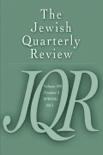
JEWISH QUARTERLY REVIEW
Illuminating Jewish Thought Through Rigorous AnalysisJewish Quarterly Review, published by University of Pennsylvania Press, is a distinguished academic journal that delves into the multifaceted realms of Jewish culture, history, and religious studies. With a rich publication history dating back to 1953 and an impressive track record of rigorous scholarship, this journal maintains a Q2 ranking in key categories such as Cultural Studies, History, and Religious Studies in 2023, placing it among the top-tier journals in its field. The ISSN number 0021-6682 and the E-ISSN 1553-0604 ensure that its scholarship is widely accessible and traceable in academic databases. While the journal is not open access, it remains an essential resource for researchers, professionals, and students seeking in-depth analysis and perspectives on Jewish thought and heritage. The JQR is known for its editorial commitment to enhancing understanding and dialogue across cultural and historical contexts, making it an invaluable asset for anyone engaged in Jewish studies and related disciplines. With its headquarters in Philadelphia, PA, the journal continues to foster scholarly engagement and critical discourse on Jewish identity and experience through its carefully curated articles and reviews.
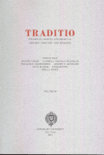
TRADITIO-STUDIES IN ANCIENT AND MEDIEVAL HISTORY THOUGHT AND RELIGION
Advancing Knowledge in Ancient and Medieval ScholarshipTRADITIO - Studies in Ancient and Medieval History, Thought and Religion is a distinguished academic journal published by Cambridge University Press, dedicated to the exploration and analysis of historical, philosophical, and religious narratives from ancient and medieval periods. The journal's ISSN is 0362-1529 and its E-ISSN is 2166-5508. Renowned for its rigorous scholarship, it enjoys a notable standing in the academic community, reflected in its 2023 category quartiles which place it in the second and third tiers across critical fields such as Literature and Literary Theory, Philosophy, Religious Studies, and Visual Arts and Performing Arts. With its comprehensive scope that encompasses multidisciplinary approaches, TRADITIO provides an essential platform for researchers, academics, and students alike to engage deeply with the complexities of historical thought and cultural practices. Although the journal operates within the traditional subscription model, its significance is underscored by impressive Scopus rankings, indicating its high visibility and impact within the arts and humanities sectors. We invite you to discover the richness of ancient and medieval studies through the pages of TRADITIO.
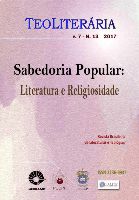
Teoliteraria-Revista Brasileira de Literaturas e Teologias
Cultivating Interdisciplinary Conversations in Literature and TheologyTeoliteraria-Revista Brasileira de Literaturas e Teologias is a distinguished open-access journal published by the Pontifícia Universidade Católica de São Paulo (PUC-SP), dedicated to the interdisciplinary exploration of literature and theology. Since its establishment in 2011, this journal has been pivotal in fostering dialogue between literary studies and theological discourse, offering scholars a platform for innovative research and thought-provoking articles. With its ISSN 2236-9937, Teoliteraria prides itself on promoting academic rigor and diversity in scholarship, making it an indispensable resource for researchers, professionals, and students pursuing insights at the intersection of these rich fields. Located in São Paulo, Brazil, the journal is easily accessible to a global audience, underscoring its commitment to knowledge dissemination and scholarly collaboration.
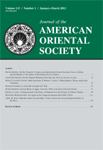
JOURNAL OF THE AMERICAN ORIENTAL SOCIETY
Fostering Dialogue Across Diverse DisciplinesThe JOURNAL OF THE AMERICAN ORIENTAL SOCIETY, published by the American Oriental Society, is a prestigious academic journal based in the United States that serves as a vital resource for researchers and scholars engaged in the fields of Asiatic studies, cultural studies, and broader humanities. Established to foster scholarly communication, this journal presents rigorous peer-reviewed articles and critical analyses that explore the diverse cultural, historical, and linguistic dimensions of the Orient. With an impact factor reflecting its scholarly significance, it occupies a Q3 position in Arts and Humanities (miscellaneous) and a Q2 ranking in Cultural Studies as of 2023. Although it does not currently offer open access, the journal maintains a strong reputation for its scholarly contributions, making it an essential platform for disseminating research findings. By bridging gaps in knowledge and fostering interdisciplinary dialogue, the JOURNAL OF THE AMERICAN ORIENTAL SOCIETY remains a cornerstone for those committed to the exploration of Asian cultural heritage and philosophy, enriching the academic community's understanding in these vital fields.

Anales del Seminario de Historia de la Filosofia
Bridging Past Philosophies with Modern InsightsAnales del Seminario de Historia de la Filosofia, published by UNIV COMPLUTENSE MADRID, SERVICIO PUBLICACIONES, is a distinguished open-access journal that has been contributing to the fields of History and Philosophy since 1980. With an ISSN of 0211-2337 and E-ISSN 1988-2564, it aims to provide a scholarly platform for the dissemination of original research and critical reviews pertinent to the historiography of philosophy and its influences on modern thought. The journal features a robust open-access model, ensuring that all published content is readily available to researchers, students, and professionals worldwide. The journal currently enjoys recognition within its field, classified within the Q3 quartile in History and Philosophy of Science and Q2 quartile in Philosophy as of 2023. Positioned within the heart of Spain, the journal facilitates international academic dialogue and invites submissions that explore the intersection of past philosophical contexts and contemporary issues. Whether you are a seasoned scholar or a budding philosopher, Anales del Seminario de Historia de la Filosofia aims to foster a deeper understanding of philosophical traditions and their ongoing relevance in today’s discourse.

Vestnik Pravoslavnogo Svyato-Tikhonovskogo Gumanitarnogo Universiteta-Seriya I-Bogoslovie-Filosofiya-Religiovedenie
Unveiling Insights in Theology, Philosophy, and Religious StudiesVestnik Pravoslavnogo Svyato-Tikhonovskogo Gumanitarnogo Universiteta-Seriya I-Bogoslovie-Filosofiya-Religiovedenie is a distinguished academic journal published by ST TIKHONS ORTHODOX UNIV in the Russian Federation, featuring a comprehensive exploration of the humanities with an emphasis on theology, philosophy, and religious studies. With an Open Access policy since 1997, the journal aims to provide a platform for scholarly discourse and research, promoting visibility and accessibility for a global audience. As a highly regarded publication, it resides in the Q2 category for History, Philosophy, and Religious Studies as of 2023, reflecting its commitment to quality and scholarly impact. Compiling rigorous research relevant to both historical and contemporary contexts, the journal serves as an invaluable resource for researchers, professionals, and students seeking to deepen their understanding of these intertwined fields. With its ongoing convergence from 2018 to 2024, the journal promises to continue contributing significantly to the academic community.

Sino-Christian Studies
Connecting Cultures: Insights into Sino-Christian StudiesSino-Christian Studies, published by Chung Yuan Christian University, is a scholarly journal based in Taiwan that focuses on the intricate dialogue between Chinese cultural contexts and Christian thought. Since its establishment in 2013, the journal has served as a platform for interdisciplinary research, exploring diverse aspects of religious studies and philosophy within the Sino-Christian landscape. Although currently categorized in the fourth quartile for both Philosophy and Religious Studies according to 2023 metrics, the journal aims to foster critical discussions and breakthrough research that enriches understanding in these fields. With an ISSN of 1990-2670 and an E-ISSN of 2224-6606, it is accessible from 200 Chung Pei Rd, Chung Li, Taiwan and remains committed to publishing significant contributions from scholars around the globe. This journal is particularly valuable for researchers, professionals, and students interested in the intersection of religion and culture, providing insights that resonate across disciplines.
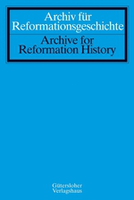
ARCHIV FUR REFORMATIONSGESCHICHTE-ARCHIVE FOR REFORMATION HISTORY
Advancing Scholarship in Reformation StudiesARCHIV FUR REFORMATIONSGESCHICHTE - ARCHIVE FOR REFORMATION HISTORY, published by GUTERSLOHER VERLAGSHAUS, serves as an invaluable resource in the field of religious studies, particularly focusing on the historical intricacies of the Reformation era. Established in Germany, this journal has a longstanding tradition, originating in 1904, and features a comprehensive scope that includes insights and scholarly articles on the developments and impacts of Reformation history, spanning various converged years, with continuing contribution up to 2023. Despite its designation in the Q4 quartile for Religious Studies, it remains an essential platform for both emerging and established scholars. While it does not offer open access, readers and researchers benefit from the journal's curated studies which provide profound historical context and analysis. By engaging with this journal, professionals, students, and researchers alike can deepen their understanding of the Reformation's legacy and its influence on contemporary religious thought.

Revista de Humanidades
Advancing Critical Dialogue in the World of HumanitiesRevista de Humanidades, published by UNIV NACIONAL EDUCACION DISTANCIA in Spain, is a distinguished open-access journal that has proudly embraced the principles of accessibility and scholarly dissemination since 2010. With an ISSN of 1130-5029 and an E-ISSN of 2340-8995, this journal caters to a broad spectrum of topics within the arts and humanities, fostering academic dialogue and knowledge sharing. It achieved a Q3 ranking in the Arts and Humanities (Miscellaneous) category for 2023, placing it in the 52nd percentile among its peers, highlighting its commitment to quality research and scholarly excellence. Researchers, professionals, and students can access its rich repository of articles and studies that span various disciplines within the humanities. With a clear focus on promoting interdisciplinary approaches and critical thought, Revista de Humanidades serves as an essential platform for emerging and established scholars alike, contributing to the ongoing evolution of the humanities field.